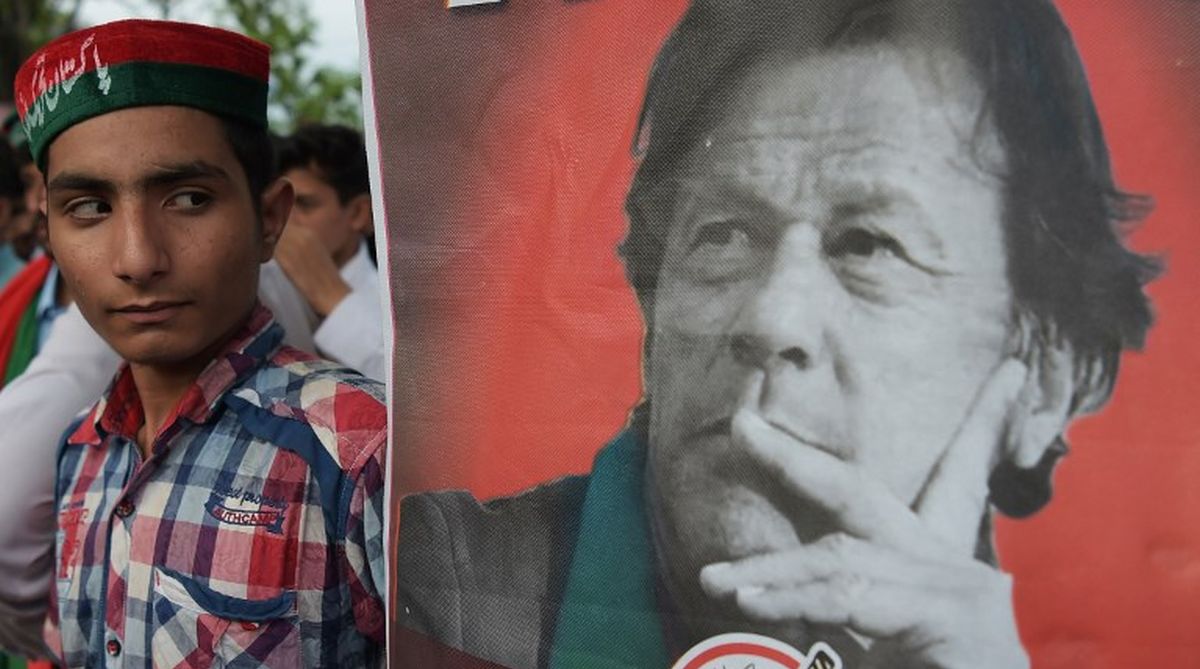Imran Khan shares mental health journey
Imran Khan discusses his ongoing mental health journey, emphasizing the importance of prioritizing wellness and seeking professional support.

Imran Khan stands next to poster in Islamabad. (Photo: AFP)
The results of the vexed elections have come out as expected. The Establishment-supported Imran Khan’s Tehreek-e-Insaf (PTI) has emerged as the largest party in the National Assembly. It is the result of his anti-corruption crusade against Nawaz Sharif, his family, his ministers and other leaders of the Pakistan Muslim League (Nawaz) and against PPP’s (Pakistan People’s party) Asif Ali Zardari.
Though the Pakistan Tehreek-e-Insaf was founded on 25 April,1996 the major stride towards success came when on 20 October 2011 PTI organised a massive rally in Lahore which was attended by more than 2 lakh people, who responded to Imran’s seminal agenda for the strengthening of economy, good law and order and progress and prosperity of Pakistan.
The Establishment (Pakistan Army and ISI) woke up from its slumber and gave full support to Imran as an alternative to Nawaz Sharif. The 65-year-old cricketer turned leader disparaged liberals, attacked feminism, embraced radical religious parties and vowed to uphold Pakistan’s blasphemy law and trod his own way in the past.
Advertisement
His party held widespread protests alleging ballot-rigging in the 2013 election, in which he received about 19 per cent of the vote and got 34 seats in the National Assembly. Later he sat on dharna from August to December 2014 in Islamabad. Though not much success came his way, he managed to show his resolve to confront Nawaz Sharif to an establishment that was feeling quite upset by the then PM’s geopolitical agenda and interference in the defence matters and foreign policy.
Imran’s critics have nicknamed him “Taliban Khan”, a reference to his earlier support for negotiations with Pakistan’s Taliban. He also has expressed admiration for the tribal system of justice that regards women and young girls as property to resolve disputes.
His latest transformation, in his non-cricket guise, is perhaps the most remarkable. At his peak as a player, Imran was among the most widely recognized Pakistanis anywhere in the world. In England especially, he was a fixture on the social circuit, while playing cricket for Sussex. He played 88 Test matches and 175 ODIs for Pakistan and led his team to victory in the World Cup of 1992.
Since giving up cricket and concentrating first on building a state-of-the-art cancer hospital (free for those who cannot afford treatment) and then on politics, Imran has campaigned from a conservative, right-leaning platform. His critics contend that it is a far cry from his 1980s heyday, though Imran himself has acknowledged publicly that it was a reawakening. He got the support of the Establishment and today he leads the largest party in the National Assembly.
He married his third wife, Bushra Maneka, in 2018 after dismissing months of speculation about it. After his marriage to Maneka, also known as Pinki Pir, was disclosed in February, he said he was drawn to the spirituality of the mother of five.
As a politician, he has proclaimed his philosophy to turn Pakistan into a just society, based on humane values, by creating an independent and honest judiciary that will uphold democracy, protect human rights and ensure the rule of law and, by promoting a merit-based system that provides equal opportunity for upward social mobility to the working classes and penury-sticken masses. Khan promised to create 10 million jobs.
However, in personal conduct there have been allegations against him first by a PTI (Pakistan Tehreek-e-Insaf) Member of National Assembly, Ayesha Gulalai alleging on 1 August 2017 that she has suffered harassment from Imran and claimed that she had been receiving offensive messages from him since October 2013.
Also, his second ex-wife Rehan Khan alleged in a book – recently published – that he had many extra-marital relations and children and has homosexual proclivities. Imran on the other hand denied all such allegations as preposterous and said that rival Muslim League (Nawaz) dexterously managed to get such salacious dirt spread against him.
It is pertinent to mention that the polling and the vote count itself have been highly controversial.
Ahead of the elections, the PML-N complained of a targeted crackdown by the security establishment both in the media and through administrative actions, with the alleged help of the courts, in favour of the PTI. The Pakistani military denied interfering in politics but independent media and foreign press perspicaciously mentioned that there were blatant attempts to muzzle them, while the human rights commission said that there are “ample grounds” to question the legitimacy of the polls.
After the polls closed, several political groups alleged that vote rigging was taking place in polling stations – something denied by election officials. Representatives from several parties said that their agents were expelled from polling stations during vote count and were denied certified copies of results – breaching election procedures.
Imran’s party has already got majority in Khyber-Pakhtunkwa and is the second largest party in Punjab. Many believe that there might be an opportunity for it to form a government in Punjab with the support of independents and defections from PML (N). Once in power as a protégé of the Establishment, Imran will have to agree to their vaulting nay domineering demands.
However, if his rivals continue to reject the results, and even potentially launch the kind of street protests Mr Khan did while in opposition, the country could face political instability. The next few weeks and months would show to the world at large how Imran navigates febrile times because it is not only the Establishment but the collapsing economy which would be arduous to tackle. The task however seems difficult. His pragmatism and expediency has worked in the past. But will it now?
The writer is an IAS officer of the Punjab Cadre and is working as Secretary to
Government of Punjab.
Advertisement